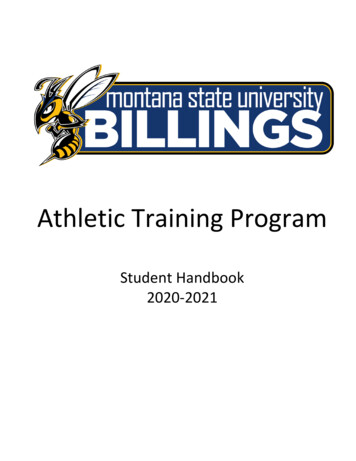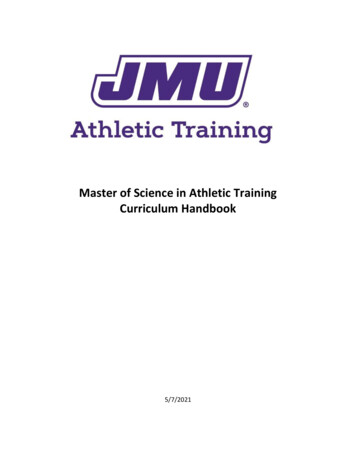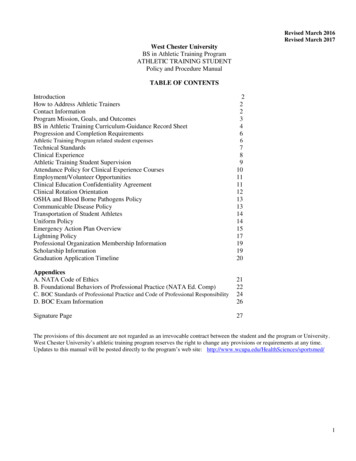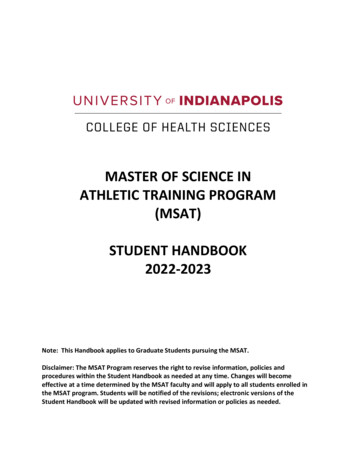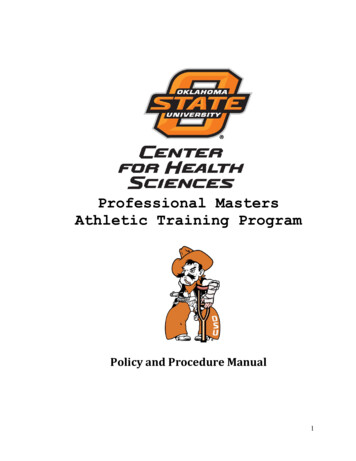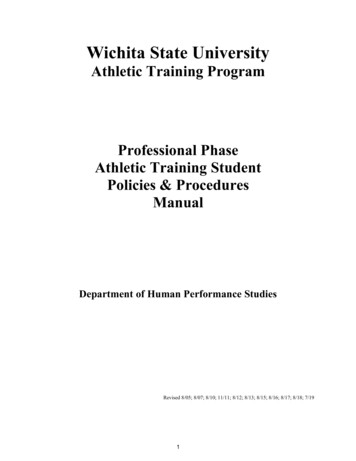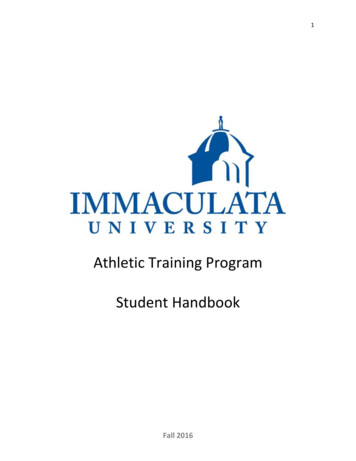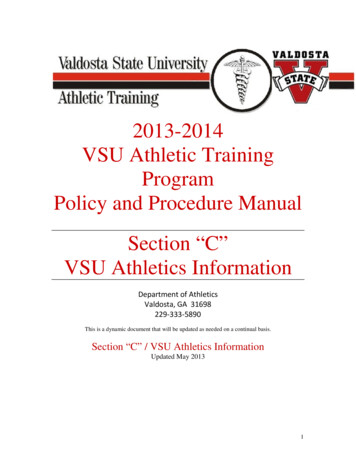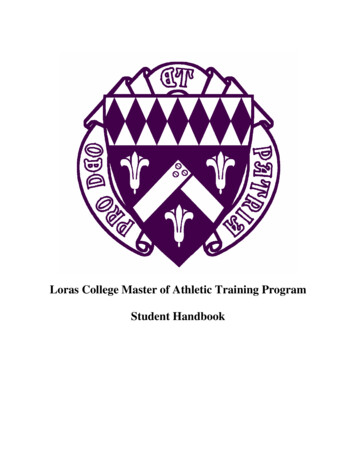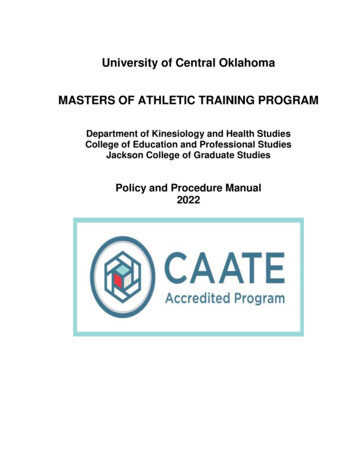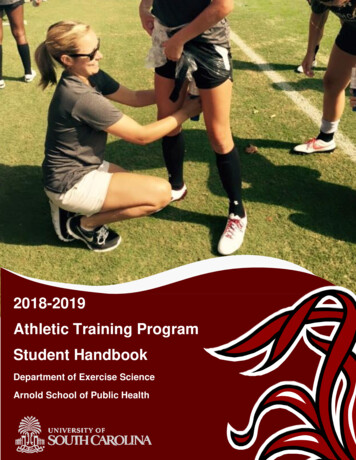
Transcription
2018-2019Athletic Training ProgramStudent HandbookDepartment of Exercise ScienceArnold School of Public Health1
TABLE OF CONTENTSI.AT Program Description .5BOC Certification .5II.AT Program Mission, Vision, and Educational Goals .5Mission .5Vision .5AT Program Goals and Objectives .6III.USC AT Program Faculty and Staff Directory .7IV.Student Academic Information .8Admission to AT Program .8Estimated Student Fees .8Student Responsibility .10Earning Credit in Transient Status .10Course Load .10Declaring a Minor .10Academic Advisement .11V.Athletic Training Curriculum .12Carolina Core Plus Athletic Training General Education .12Stand Alone or Overlay Eligible Courses .14Elective Courses .14Athletic Training Core Requirements .14Additional Athletic Training Requirements .15Program Checklist for Athletic Training BS Degree .16VI.AT Clinical Education .17Clinical Education Assignments .17Clinical Evaluation and Assessment .17Clinical Evaluation by Preceptor .18Evaluation of Preceptor and Clinical Education Site .19Clinical Education Experience Hours Policy.19Requirements for Clinical Education Hours .202
Supervision of AT Program Students .20VII.Clinical Education General Information .20Employment during Clinical Assignments .21Clinical Education Attendance/Punctuality .21Clinical Education Rules and Guidelines .21General Rules .21Visiting Teams .22Travel .22Athletic Participation .22ATS Clinical Requirements .22Athletic Training Student Code of Conduct .22Inappropriate Behavior Policy .23Athletic Training Student Relationships .23Professional Appearance Policy.24Confidentiality .25Confidentiality Agreement Policy.26Social Media Policy .26Criminal Background Check and Reporting Policy .27Violations of Code of Conduct .27Probation/Dismissal .27Student Grievances .28VIII.Athletic Training Student Health and Safety .39University of South Carolina Wellness Programs: Alcohol, Drugs, and Health .29Technical Standards Policy .29Athletic Training Student Insurance .30Acknowledgment of Risk .30Workers’ Compensation Policy .31Active Communicable and Infectious Disease Policy .32Immunization Policy .32Hepatitis B Immunization Policy .333
Post-Exposure Evaluation and Follow-Up .34IX.APPENDICES.36Appendix A: NATA Code of Ethics .36Appendix B: BOC Standards of Professional Practice . 38Appendix C: Carolinian Creed .42Appendix D: University of South Carolina Wellness Program: Alcohol, Drugs, and Health .43Appendix E: University of South Carolina AT Program BBP Exposure Control Plan .45Appendix F: General Health and Safety Information . .624
INTRODUCTIONFaculty and students associated with the Athletic Training Program (AT Program) are governed by the policiesand procedures of the University of South Carolina (USC) as documented in the Faculty Manual, Arnold Schoolof Public Health Faculty Guidelines, and the Graduate School. This document is designed to set forth the policiesand procedures of the AT Program and is intended to enhance, clarify, and supplement (not replace) those of theUniversity, School and Graduate School of USC.I. AT Program DescriptionThe USC AT Program is housed in the Department of Exercise Science in the Arnold School of Public Health.The USC AT Program has maintained its accreditation through the Commission on Accreditation of AthleticTraining Education (CAATE) since 1992. At this time, the USC AT Program is one of only five CAATE-accreditedathletic training education programs in South Carolina, and one of only seven undergraduate programs in theSoutheastern Conference (SEC).The USC AT Program provides students with the theoretical knowledge and understanding of the allied healthprofession of athletic training as well as current procedures and techniques in sport injury management. Studentsgain this knowledge through required coursework and clinical experiences as they prepare to make successfulcontributions to the athletic training profession. The program combines formal classroom instruction and clinicalexperiences in a process that culminates in the student graduating with eligibility to sit for the Board ofCertification (BOC) examination. Students who graduate from the program and subsequently pass the BOCexamination will be qualified to be employed as an athletic trainer in a variety of allied health settings, includingsecondary schools, colleges and universities, professional athletic teams, sports medicine clinics, or in industrialpreventative medicine clinics. In addition, students who complete prerequisite course requirements may pursuegraduate education in athletic training, exercise physiology, physical therapy, health, physical education, or otherallied health professions.BOC CertificationIn order to become a certified as an AT, the ATS must graduate from an accredited athletic training program andpass the BOC examination. Students enrolled in the USC Athletic Training Program (AT Program) must meetBOC requirements in order to apply to take the examination.Please visit the Board of Certification website (www.bocatc.org) for additional information.II. AT Program Mission, Vision, Goals, and ObjectivesMissionThe mission of the University of South Carolina’s Athletic Training Program is to create a center of excellence forthe advancement of athletic training, through the integration of innovative, interdisciplinary, and transformationaleducation, research, evidence-based practice, and community engagement. The University of South CarolinaAthletic Training Program will develop competent and compassionate athletic training leaders and lifelonglearners who will enhance health-related outcomes for a population of diverse individuals and communitiesthroughout South Carolina, the nation, and internationally.VisionThe University of South Carolina Athletic Training Program’s vision is to achieve prominence as an innovator inthe integration of interdisciplinary education, research, evidence-based practice, and community engagement.5
The Program will advance the profession of athletic training, our community of learners, current and futureathletic training leaders, health-related outcomes, and healthcare policy at all entries of practice.USC AT Program Goals Graduates of the USC Athletic Training Program will be able to demonstrate knowledge and skills requiredof entry-level athletic trainers.The USC Athletic Training Program’s didactic education and individual clinical education sites will providequality education in a safe environment for students.USC AT Program Objectives Athletic training students will demonstrate the knowledge and skills necessary for entry-level athletictrainers to use a systematic approach to ask and answer clinically relevant questions that affect patientcare by the review and application of existing research evidence.Athletic training students will demonstrate the ability to develop and implement strategies and programs toprevent the incidence and/or severity of injuries and illnesses and optimize their clients’/patients’ overallhealth and quality of life.Athletic training students will demonstrate strong clinical examination skills in order to accurately diagnoseand effectively provide treatment in diverse patient populations and health care settings.Athletic training students will demonstrate the knowledge and skills necessary to evaluate andimmediately manage acute injuries and illnesses.Athletic training students will be able to assess a patient’s status using clinician- and patient-orientedoutcome measures and, based on this assessment and with consideration of the stage of healing andgoals, design a therapeutic intervention to maximize the patient’s participation and health-related qualityof life.Athletic training students will demonstrate the ability to recognize clients/patients exhibiting abnormalsocial, emotional, and mental behaviors and to intervene and refer these individuals as necessary.Athletic training students will demonstrate an understanding of risk management, healthcare deliverymechanisms, insurance, reimbursement, documentation, patient privacy, and facility management.Athletic training students will demonstrate the ability to maintain current competence, practice within thelimits of state and national regulation using moral and ethical judgment, and work collaboratively withother healthcare providers.Athletic training students will demonstrate the ability to synthesize and integrate knowledge, skills, andclinical decision-making into actual client/patient care.The USC Athletic Training Program will provide quality instruction in didactic courses of athletic trainingknowledge, skills, and abilities.Clinical education will follow a logical progression that allows for increasing amounts of clinicallysupervised responsibility leading to autonomous practice upon graduation. The clinical education plan willreinforce the sequence of formal instruction of athletic training knowledge, skills, and clinical abilities,including clinical decision-making.Clinical education will provide students with authentic, real-time opportunities to practice and integrateathletic training knowledge, skills, and clinical abilities, including decision-making and professionalbehaviors required of the profession in order to develop proficiency as an Athletic Trainer.Clinical education will provide a variety of patient populations, care providers, and health care settings.Students will gain clinical education experiences that address the continuum of care that would prepare astudent to function in a variety of settings with patients engaged in a range of activities with conditionsdescribed in athletic training knowledge, skills and clinical abilities, role delineation study and standards ofpractice delineated for a certified athletic trainer in the profession.All clinical education sites will be evaluated by the program on an annual and planned basis.6
III. USC AT Program Faculty and Staff DirectoryUSC AT Program FacultyJim Mensch, PhD, SCAT, ATCAT Program DirectorOffice #102Office Phone#(803) 777-3846E-mailjmensch@mailbox.sc.eduAmy Hand, MA, SCAT, ATCAT Clinical Education Coordinator101-A(864) 590-5257fraleyal@email.sc.eduToni Torres-McGehee, PhD, SCAT, ATCPost-Professional AT Program Director212(803) 777-0636torresmc@mailbox.sc.eduJustin Goins, PhD, SCAT, ATC, CSCSPost-Professional AT Clinical EducationCoordinator101-P(803) 777-9860goinsj@mailbox.sc.eduSusan Yeargin, PhD, SCAT, ATCAssociate ProfessorPHRC226(803) 777-3169syeargin@mailbox.sc.eduJessica Rager, MS, LAT, ATC, PES, CESClinical Instructor101-B(803) 777-4616ragerj@mailbox.sc.eduChandler Fogle, MSAcademic Advisor—Athletic TrainingPHRC206D(803) 576-6357FOGLECA@mailbox.sc.eduUSC Adjunct FacultyAshly Goins, MS, SCAT, ATCOffice #Strom ATROffice Phone#(803) 576-9385E-mailashly.goins@uscmed.sc.eduClint Haggard, MS, SCAT, ATCFootballATR(803) 777-5574chaggard@mailbox.sc.eduNichee Lloyd, PTPalmettoHealth(803) 749-5031nlloyd@drayerpt.comMark Rodger, MAT, SCAT, ATCColonial(803) 777-5182Center ATRrodger@mailbox.sc.eduStephanie Rosehart, MS, ATCCPR CoordinatorRoost ATR(803) 413-9025rosehart@sc.eduRachel Sharpe, MS, SCAT, ATCFootballATR(803) 777-8157sharperl@mailbox.sc.eduGeorge Wham, EdD, SCAT, ATCPelion HighSchool(803) 821-2258Gwham@lexington1.net7
PhD StudentsRebecca Hirschhorn, MS, SCAT,ATC, NREMTOffice #211Phone#(703) 963-3722E-mailhirschhr@email.sc.eduSamantha Weber, MS, SCAT, ATC213(414) 828-5000srweber@email.sc.eduAlly Smith, MS, SCAT, ATC211(740) 255-1323abs16@email.sc.eduIV. Student Academic InformationAdmission to AT Program**The BS in Athletic Training degree at USC has been terminated and will no longer be acceptingapplicants**The Commission on Accreditation of Athletic Training Education (CAATE) recently announced that allprofessional education in athletic training must be at the master’s degree level. A Bachelor of Science degree inAthletic Training is no longer offered as a major for undergraduate students at the University of South Carolina.We are in the process of transitioning our athletic training program and have plans to launch a new ProfessionalMaster’s Program in Athletic Training in summer of 2019.Students interested in a career in athletic training are encouraged to consider USC’s current Bachelor of Sciencedegree in Exercise Science. This degree has practicum experiences and prerequisite courses that will preparestudents for the Professional Master’s Program in Athletic Training.If you have any questions about athletic training or the degree change, do not hesitate to contact Dr. Jim Mensch(AT Program Director) at jmensch@mailbox.sc.eduEstimated Student FeesUniversity and Department Fees:The fees represented in this table are an estimation of costs and should not be interpreted as an exact quotationor billing amount. Fees can also be found on the University Bursar’s Office website:http://www.sc.edu/about/offices and divisions/bursar/tuition and required fees/usc columbia fees academic/department fees/index.phpFee DescriptionUndergraduate Student Technology FeeNewly Admitted Student (Matriculation Fee)ATEP 267ATEP 275ATEP 300ATEP 310ATEP 292, 293, 392, 393, 492, 494ATEP 348L, 349L, 350L, 365, 366L, 466, 4962017-18 Amount/Class 200.00 80.00 150.00 75.00 100.00 100.00 250.00 30.008
AT Program Fees:In addition to university and department fees, athletic training students in the University of South Carolina AthleticTraining Program may have other fees associated with being a student in the program. These expenses aredescribed here with estimates to help with planning. These fees are subject to change from year-to-year. Clinical Clothing (some are optional) – Students should be prepared to purchase clothing based on theAT Program’s Professional Appearance Policy. Items include, but are not limited to, khaki pants/shorts,collared shirts, inclement weather gear, and a watch.Health Insurance – Clinical sites may require students to provide evidence of adequate health insuranceto cover long-term and emergency treatment or to be prepared to pay for such services.Immunizations – Professional program students must provide evidence of the immunizations required foradmittance into the university (2 doses of MMR – measles, mumps, rubella; meningococcal vaccine).Students must also receive 3 doses of vaccine (or initiation of the process) or signed waiver of declinationof Hepatitis B. An annual influenza vaccination is also recommended.Technical Standards Assessment – An assessment by a medical doctor must be performed prior toadmittance in order to ensure students meet the technical standards required to participate at their clinicaleducation site(s). Students must update the technical standards form if their ability to work clinically oracademically changes significantly enough to hinder their normal clinical or academic progress.Professional Organization Membership(s) and Symposiums (optional) – Including, but not limited to:NATA, MAATA, SCATA, SCATSA, ACSM, and NSCA.Travel Expenses – AT students are responsible for transportation to and from assigned clinical sites,which varies each semester.CPR Recertification – Students are required to be CPR and first-aid certified throughout their time in theAT Program. Certification must be completed every other year.Carolina Card Fee and AT Student ID Badge – Students must provide their Carolina Card in order toget into the Blatt PE Center, where the majority of Athletic Training classes are held. Students areresponsible for paying for a new card if theirs is lost or damaged. It is part of the AT Program’sProfessional Appearance Policy that student wear an AT Student ID badge during all clinical experiences.Fee DescriptionClinical ClothingHealth InsuranceImmunizations MMR Tuberculosis Test Hepatitis B InfluenzaTechnical Standards AssessmentProfessional Organizations NATA – student SCATSA ACSM – student NSCA – studentTravel ExpensesCPR Certification/RecertificationCarolina Card Fee Damaged Card Replacement CardAT Student ID Badge2017-18 Amount 100.00variableFrequencyannualannual 95.00 31.00 112.00 20.00one timeannualone timeannualvariableone time (updated if changes) 80.00 40.00/year, 25.00/semester 10.00 65.00annualannual/semesterannualannualvariable 45.00annualone time 25.00 35.00 20.00one timevariableone time9
Student ResponsibilityThe Arnold School of Public Health faculty and staff work diligently to provide students all the information that isnecessary to complete its undergraduate programs in a successful and timely manner. However, it is thestudent’s responsibility to thoroughly read all of the information available in this handbook, handouts on theCollege’s website https://www.sc.edu/study/colleges schools/public health/index.php and in the USCUndergraduate Bulletin: http://www.sc.edu/about/offices and divisions/registrar/academic bulletin/index.phpIt is the student’s responsibility to maintain accurate and current address and phone number information bothwith the Office of Student Services in the Arnold School of Public Health and with the USC Registrar’s office. Anyexception to requirements must be submitted in writing to the Arnold School of Public Health, and until a studenthas received a written response in the affirmative, the exception does not exist.Earning Credit in Transient StatusStudents must request permission prior to taking a course from another institution in transient status. To do this,a student should meet with his/her advisor to discuss the course being requested and to complete a SpecialEnrollment Request form. The student should bring a description of the course they plan to take to that meeting.A grade of C or better must be earned in the transient course in order for it to transfer back to USC. Grades lowerthan a C do not transfer to USC. Therefore, any transfer course in which a grade less than C was earned cannotbe used for degree credit. The last 30 credit hours toward your degree must be earned in residence at theUniversity of South Carolina.Course LoadStudents must seek permission from their academic advisor to take a course load in excess of 17 hours.Students in the Arnold School of Public Health will not be allowed to register for more than 17 hours in a fall orspring semester unless they have earned at least a B average on the previous (most recent) 12 hours ofcoursework taken. In addition, the advisor will take into account the student’s overall academic status whendetermining if a course overload will be granted and how many total hours would be approved. The ArnoldSchool of Public Health does not recommend any student take an overload of hours, and students who do soshould be aware of the academic workload required for the courses they plan to take.Students who register for a course load of more than 16 semester hours in a fall or spring semester will pay anadditional per hour fee as outlined in the schedule of fees available from the Bursar’s Office (www.sc.edu/bursar).Declaring a MinorMinors are not required for Athletic Training majors. Athletic training students may, however, elect to declare aminor. A minor is a series of courses that display a distinct curricular pattern in one discipline that is differentfrom the major.All minor requirements are outlined in the university undergraduate bulletin. Before declaring a minor, studentsshould read the requirements of the minor and determine if all courses can be completed by their anticipatedgraduation date. A course used to meet a degree requirement may not be used to meet a requirement of theminor. However, courses taken to meet a minimum elective requirement may be used in the minor. All minorcourses must be passed with a grade of C or better.Certain minors may not be appropriate for a given major. Students should consult with their advisor to discussthe minor declaration process.10
Academic AdvisementAcademic advisors for the AT Program are located with the ASPH Office of Undergraduate Student Services.Any questions related to academic advising for AT Program or to make an appointment with the AT advisorplease visit: http://sc.edu/about/offices and divisions/advising/college advising/public health/index.phpThe Athletic Training Program Advisor is Chandler Fogle. You can find him in PHRC 206-D.The formal advisement period consists of approximately 4-5 weeks during which you will schedule anappointment to plan your course work for the next semester. You will receive an email through the universitystudent email system informing you of the dates for advisement and the steps which you need to follow to sign upfor an advisement appointment. You will not be permitted to pre-register for classes until you have met with yourassigned advisor. Students who miss the formal advisement period will not be advised until late advisement,which will be a specified date after open registration.11
V. Athletic Training CurriculumBachelor of Science in Athletic Training (BS) (2017-2018)Degree Requirements (Total semester hours: 122-131)Carolina Core Plus Athletic Training General Education (44-56 hours)CMWEFFECTIVE, ENGAGED, AND PERSUASIVECOMMUNICATION: WRITING (6 hours)Complete 6 hours (two courses) as follows:Grade of C or better required ARPANALYTICAL REASONING & PROBLEM SOLVING(6 hours)Complete 6 hours (two courses) from:Grade of C or better required SCISCIENTIFIC LITERACY (20 hours)ENGL 101 (3)ENGL 102 (3)MATH 122 (3)MATH 141 (4)MATH 142 (4)MATH 170 (3)MATH 172 (3)PHIL 110 (3)CSCE 101 (3) CSCE 102 (3)CSCE 145 (4)STAT 110 (3) orSTAT 112 (3)STAT 201 (3)STAT 205 (3)Complete 20 hours in science as follows:Grade of C or better requiredSelect one of the following courses/course sets (4hours): BIOL 101 - Biological Principles I and BIOL 101L BIOL 110 - General Biology BIOL 120 - Human Biology and BIOL 120LSelect one of the following courses/course sets (4hours): PHYS 101 - The Physics of How Things WorkI and PHYS 101L PHYS 201 - General Physics I and PHYS 201LSelect one of the following courses/course sets (4 hours): CHEM 102 - Fundamental Chemistry II CHEM 111 & 111L - General Chemistry I and LabSelect one of the following courses/course sets (4 hours): EXSC 223 & 223L - Anatomy and Physiology Iand Lab BIOL 243 & 243L - Human Anatomy andPhysiology I and LabSelect one of the following courses/course sets (4 hours): EXSC 224 & 224L - Anatomy and Physiology IIand Lab BIOL 244 & 244L - Human Anatomy andPhysiology II and Lab12
GFLGLOBAL CITIZENSHIP AND MULTICULTURALUNDERSTANIND: COMMUNICATE EFFECTIVELY IN MORETHAN ONE LANGUAGE (0-6 hours)Complete the Carolina Core approved courses in ForeignLanguage (GFL) or by achieving a score of 2 or better on aUSC foreign language placement test.If qualifying score not met, must complete 6 hours from: GHSGSSAIUFREN 109 (3)FREN 110 (3)GERM 109 (3)GERM 110 (3)GERM 111 (6) LATN 109 (3)LATN 110 (3)SPAN 109 (3)SPAN 110 (3)SPAN 111 (6)or 4 hours from: ARAB 121 (4) CHIN 121 (4) GREK 121 (4) ITAL 121 (4) JAPA 121 (4)PORT 121 (4)RUSS 121 (4)GLOBAL CITIZENSHIP AND MULTICULURALUNDERSTANDING: HISTORICAL THI
Graduates of the USC Athletic Training Program will be able to demonstrate knowledge and skills required of entry-level athletic trainers. The USC Athletic Training Program's didactic education and individual clinical education sites will provide quality education in a safe environment for students. USC AT Program Objectives
